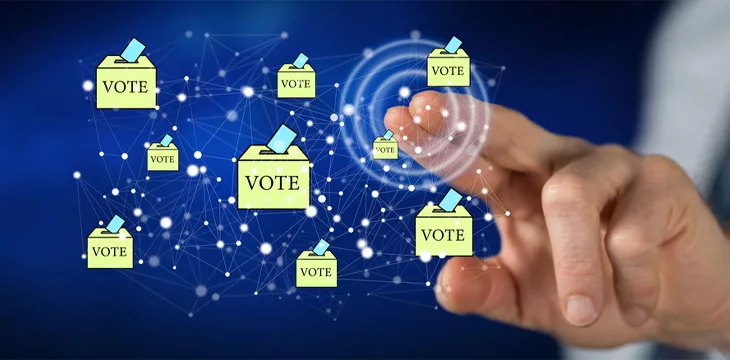|
Getting your Trinity Audio player ready...
|
Researchers from Singapore believe they have solved the governance and voting challenge that has held back decentralized autonomous organizations (DAOs).
The team of researchers from the Singapore University of Social Sciences assessed the existing voting models, listing their challenges and breakthroughs, before unveiling what they say is the ultimate DAO governance mechanism.
In its research paper titled “Voting Schemes in DAO Governance,” the team listed five voting mechanisms most used by DAOs.
Token-based quorum voting requires voters to exceed a set threshold, like 60% of the votes to pass a proposal, such as with lending protocol Aave. To address monopoly by token whales, some DAOs like Gitcoin rely on quadratic voting, where users can allocate multiple tokens to express the intensity of their voting preferences.
Some DAOs rely on weighted and reputation-based voting, where voters’ influence on an outcome depends on the votes assigned to them. In knowledge-extractable voting (KEV), the weight of a vote relies on the expertise a voter has on the proposal under the vote. Multi-sig voting requires multiple approvals before a proposal is executed.
Others include rage quitting voting, conviction voting, and holographic consensus.
Holographic consensus received the best rating in the researchers’ appraisal. It scored a high rating in efficiency, scalability, and fairness and a medium rating for robustness. Token-based quorum voting and multi-sig voting were the lowest-ranked.
But what if you combined the best attributes of the existing mechanisms to produce the best voting mechanism for DAOs? This is the task the researchers set out to conquer, and their solution is conviction voting with borrowed elements from holographic consensus.
Under the proposed hybrid mechanism, DAO members would place bets on any proposal with tokens. Their decision is unknown to other members. If the bid they voted for fails, they lose their tokens, which are distributed to those who voted against it.
“Under the incentive schemes, everyone is incentivized to submit a good proposal that is more likely to pass and get rewarded,” the researchers noted.
“More importantly, the betting process provides incentives for voters to vote carefully if they place a bet on the proposal. Urgent and good proposals could be speeded up and approved faster. It is more efficient than a pure conviction voting mechanism.”
Watch Craig Wright Q&A: DAO is a partnership but with no liability protections

 07-05-2025
07-05-2025 





